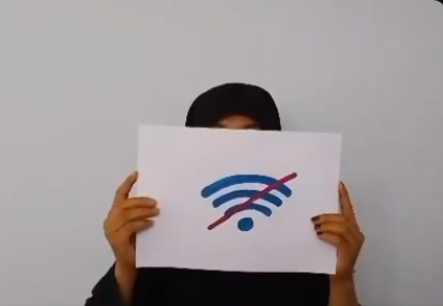
Over the past weeks, acting on orders from their leader Hibatullah Akhundzada, the Taliban have imposed a sweeping ban on fibre-optic internet, commonly known as “Wi-Fi”, in multiple provinces across Afghanistan, including Balkh, Baghlan, Badakhshan, Kunduz, Nangarhar, and Takhar. Taliban officials justify the measure by invoking the prevention of “immorality.”
As of September 29th, 2025, both Wi-Fi and mobile data have been cut across the entire country, leaving Afghanistan in a total internet blackout. This nationwide shutdown has severed the population from online communication and digital services, intensifying isolation and disrupting essential services, education, and humanitarian efforts.
What This Means in Practice
For many Afghan women and girls, the internet has become a crucial lifeline:
- Education: Since secondary schooling and university attendance for girls and women have been banned under Taliban rule, women and girls rely on online courses and online schools. The ban on Wi-Fi severs access to stable platforms needed to continue their education.
- Civic activism and advocacy: Secret schools, online peer networks, girls’ study groups, human rights and women’s rights organizations, all of which have been operating with significant risk, depend on digital connections. Cutting off Wi-Fi curtails these spaces of resistance, silences voices, and reduces the ability to organize and demand their rights.
- Social & family connections: Many women are geographically separated from their families or diaspora networks, especially since being forced out of public life. The internet has been one of the few ways to maintain emotional, informational, and familial connections. The ban threatens to leave many even more isolated.
Voices from Our Partners
We have spoken to some of our partners on the ground, who shared firsthand accounts of how the Wi-Fi ban is affecting education, livelihoods, and advocacy:
“Unfortunately, it is a very hopeless situation. Each day, new provinces are banned from accessing Wi-Fi. I have far fewer students in my online classes across seven provinces. Today, no one showed up.” — Initiative providing online English classes for women
“Our work depends on Wi-Fi. We promote our products online, and we receive orders through WhatsApp. This ban is going to have a profound impact on us. Since we are not allowed to have physical stores, if this continues, it will end our business.” — Small tailoring collective
“The world learned about their (Taliban) atrocities through the internet. We shared reports and photos of our activities and protests with the media online. For now, we still have access to mobile data, but it is costly. I only hope they do not ban that too, we are truly fed up.” — An advocacy group
These voices highlight the crucial role of women-led civic initiatives in Afghanistan. Femena works with dozens of women who are educating their communities, supporting fellow women through small businesses, and running grassroots educational initiatives. By cutting off internet access, the Taliban are not only silencing voices but also undermining these vital networks of support, learning, and community empowerment that women have built under extreme risk.
Voices of Protest from the Ground
“Banning Wi-Fi is not only restricting access to a platform, it is silencing the people, which is exactly what the Taliban aim to do. It curtails freedom of speech, limits girls’ access to education, cuts family communication channels, and increases insecurity in how we connect. Access to information is a basic right, and without it we are left in darkness.” — Woman Human Rights Defender
“This is yet another restriction imposed by the Taliban. Through this ban, they are not only disrupting people’s daily lives but also silencing the voices of advocacy and demands for rights. People already face financial and social struggles under Taliban rule, and now they are even denied the ability to use the internet to speak out.” — Woman Protester
“Access to the internet is essential in any society for maintaining communication, for providing services, and for vital sectors such as healthcare. By banning Wi-Fi, the Taliban once again prove that they are deliberately attacking people’s rights.” –– Male Civil Society Member
“Cutting off the internet is not just shutting down a tool; it is silencing the voices of women, youth, and all the people of this land. With this act, the Taliban want to isolate us from the world, conceal the truth, and destroy freedom of expression.” — Petoni Amiri, Woman Protester
The Wi-Fi ban is a deliberate act of repression. By stripping access to information and communication, the Taliban are violating fundamental rights to freedom of expression and education, disproportionately targeting women and girls. International groups, including the Malala Fund, have called for urgent pressure to restore connectivity. Each day without internet deepens the isolation of Afghan women, erodes civic life, and silences their advocacy, placing them in an even more difficult situation than they already face. Without access, Afghans, especially women, are being pushed further into darkness.

